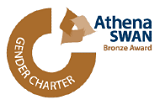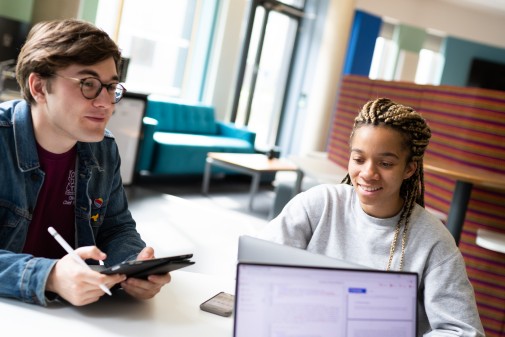
Preparing to study Computer Science

Introduction
To help you make the transition to university, we've put together some resources which we hope you will find useful.
We have links to free courses, tips on brushing up your skills, recommended reading, and useful information if you're looking to purchase a new computer for your studies.
Hoping to join us in the Autumn? Congratulations! In late August / Early September, we will provide more information about induction sessions and social activities which will take place in your first week. The aim of these sessions is to help you settle into life as quickly as possible.
Questions? Contact us! Email us at cs-ug-admissions@york.ac.uk and we'll be happy to help.
Preparing for University
To support your transition to higher education, the University of York has created an online short course exclusively for offer holders which will help you prepare for the whole university experience.
This two-week course is completely free of charge and uses the FutureLearn platform. You can participate from anywhere in the world - all you need is an internet connection and a web browser.
Professor Andy Hunt is based in the School of Physics, Engineering and Technology here at the University of York. He has recently updated his book Surviving and Thriving at University, and is providing an extract completely free of charge to new students, or to those who would welcome extra support.
- Access Surviving and Thriving at University (PDF
 , 3,092kb) (PDF sample - UoY login required)
, 3,092kb) (PDF sample - UoY login required)
Preparing for Computer Science
If you're looking to brush up on your maths and programming skills over the summer, then this is the place to start!
Mathematics
- A Level Maths Revision - A great resource with tutorial videos and past A Level papers for both Mathematics and Further Mathematics.
- Project Euler - Free to use, Project Euler offers a range of mathematical and computer programming problems.
- MIT Mathematics open courses - A fantastic range of courses at undergraduate and graduate levels. If you’re looking for a challenge in mathematics, this is it!
Programming
- Code Academy - If you're not sure where to begin, Code Academy takes you through the fundamentals of Computer Science, with opportunities to put your learning into practice.
- LearnPython.org and www.learn-c.org - Free, interactive tutorials which guide you through programming, from learning the fundamentals through to more advanced concepts.
- Code Wars - Codewars combines programming and competition in order to hone your programming skills.
Preparatory activities before you start
We're often asked by new students whether there is any preparatory reading that can be done before joining us here at York. We've therefore put together a reading list for you to explore, together with recommendations for online talks and lectures in the field of Computer Science.
We don't expect you to buy all the books on the list: you should be able to find many of them in your local library. Equally, we don't expect you to have read and watched everything by the start of the academic year, but we hope you start to explore the material, and that you find it interesting.
Reading List
A good all-round introductory text to the study of Computer Science is that by Brookshear(2). If you would like something more advanced (and fun), then take a look at Harel and Feldman’s text(8). For a thought provoking discussion of the consequences of the creation of superintelligent machines, the text by Bostrom(1) is excellent. Complementing Bostrom's text is Russell's work on AI(10), which is currently very topical. Computer Science students who would like to prepare for the hardware modules may find Clements(4) useful. Downey(6) provides an introduction to programming in Python for beginners. To explore Human-Computer Interaction, the texts by Christian(3), Fry(7) and Krug(9) are good starting points. Cottrell’s book(5) is a useful guide to study skills at university, and prepares you for what to expect before, during and after your studies.
When you arrive, recommended reading will also be indicated for each module that you will be studying. You should be able to borrow these books from the University Library.
- Nick Bostrom. Superintelligence: Paths, Dangers, Strategies. Oxford University Press, 2014, 2016 (reprint).
- J. Glenn Brookshear. Computer Science: An Overview. Pearson, Thirteenth edition, 2019.
- Brian Christian. Algorithms to live by: The Computer Science of Human Decisions. William Collins,Twelfth edition, 2017.
- Alan Clements. Principles of Computer Hardware. Oxford University Press, Fourth edition, 2006.
- Stella Cottrell. The Study Skills Handbook. Bloomsbury Academic, Fifth edition, 2019.
- Allen B. Downey. Think Python: How to think like a Computer Scientist. O'Reilly Media, Second edition, 2015.
- Hannah Fry. Hello World: How to be Human in the Age of the Machine. Black Swan, 2019.
- David Harel & Yishai Feldman. Algorithmics: The Spirit of Computing. Springer, Third edition, 1987, 2014 (reprint).
- Steve Krug. Don’t make Me Think, Revisited: A Common Sense Approach to Web Useability. New Riders, Third edition, 2014.
- Stuart Russell. Human Compatible: AI and the Problem of Control. Penguin, 2020.
Talks and Presentations
- Greg Brockman, The Inside Story of ChatGPT's Astonishing Potential, TED2023, April 2023
- Nick Espinosa, The Five Laws of Cybersecurity, TEDxFondduLac, September 2018
- Shohini Ghose, A Beginner's Guide to Quantum Computing, TEDWomen, November 2018
- Madeline Griswold, How Computer Science Made Me Brave, TEDxBrownU, October 2019
- Fei-Fei Li, How We're Teaching Computers to Understand Pictures, TED2015, March 2015
- Hadi Partovi, Computer Science is for Everyone , TEDxRainier, December 2014
- Stuart Russell, The Dangers of Artificial Intelligence, Science Time, September 2022
- Stuart Russell, 3 Principles for Creating Safer AI, TED2017, April 2017
First year reading
Want to keep really busy over the summer? It is by no means essential to complete the indicative reading before you start but, if you wish, you can take a look at the recommended reading for two of our first year modules:
- Theory 1: Mathematical Foundations of Computer Science
- Software 1: Foundations of Programming for Computer Science
Advice about computers
The Department has three dedicated software labs which are available to our students 24 hours a day, 7 days a week. Our lab PCs are set up with all the software needed for teaching and assessments, and are upgraded on a regular basis by our specialist in-Department team.
Many students have their own PCs or laptops and we know students may prefer to use their own machines. Some find laptops more practical; others prefer to have a desk-top PC - the choice is yours.
To support your studies in the Department of Computer Science, a laptop or PC with at least 500GB hard disk is ideal, as it enables you to dual boot Windows and Linux if you wish. 8GB RAM is a minimum and i3 is the minimum processor to go for. We recommend an SSD as the performance will be much better.
While we don’t teach anything that has Mac-specific software, you can buy a Mac laptop if you prefer. All our teaching is in Linux and Windows, so most applications will either have a Mac version or will compile in macOS. You can dual boot Windows and macOS using Boot Camp and we can provide some software in Windows if you need it.
Purchasing your computer:
- Further information about the recommended PC specification for taught students
- Student discounts and preferred suppliers
Follow us
Frequently asked questions
When you start your studies at York, you'll no doubt have lots of questions!
We've pulled together the answers to questions that are most frequently asked by our new students. Of course, if you can't see the answer to your question here, then contact us at cs-ug-admissions@york.ac.uk, and we'll be happy to help.
